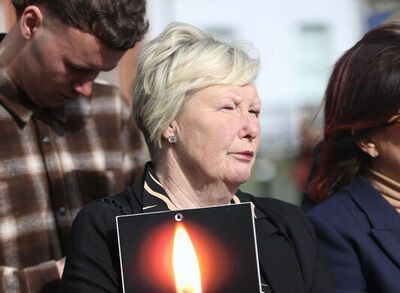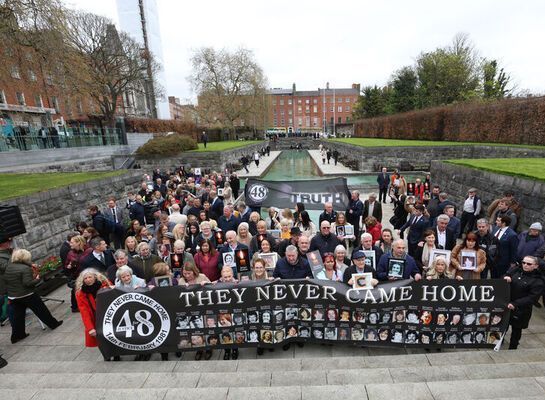Tom Phelan. BERNIE KEATING PHOTOGRAPHY
By Tom Phelan
[An excerpt from an upcoming memoir, “Working for JohnJoe”]
Like the Eskimos, who have learned to live in snow, the Irish have learned to live and work in rain in its many manifestations, except for one – “spilling” rain. “It’s spillen, lads.”
Spilling rain, like bullets from machine guns, goes clean through overcoats, shirts, socks and caps; it happens when God wrings out the black clouds, and crashes his thunder to blast the piercing rain from the skies.
My siblings and I walked to school every day unless it was spilling. On those days, Uncle Jack tackled and yoked the red pony to the cart in the shelter of the Car Shed. Red was bigger than our black pony, but where Black was a sedate female, Red had maintained the mindset of an aggressive stallion who did not want to believe his equine jewels had been removed at an early age. Mam and the children drove Black; only Uncle Jack and Dad dared drive Red.
By the time we were ready to leave for school on a spilling morning, a thick layer of barley straw had been spread on the floor of the pony’s cart. Amid a long duet of man-shouts and equine snorts and squeals, of manual and dental threats, Uncle Jack had enchained Red between the shafts, and in a state of high excitement, the pony trembled as he struggled to suppress the roiling energy confined beneath his red hide.
When we ran from the kitchen to the Car Shed, Uncle Jack was already outfitted against the weather. Standing in front of Red, he had an iron-fisted grip on each side of the pony’s bit. Dad caught each of his children and flung us up over the wingboard into the straw. We lay flat with our feet to the rear of the cart, our schoolbags our pillows. Two capes were spread over us. Then Dad took over the controlling of Red, and Uncle Jack sprang into the cart, settled himself on the seat and clutched the reins in both hands. Finally, bending his head to avoid smacking it into the lintel, he signaled to Dad step aside.
From the floor of the cart, I could not see Mam standing at the kitchen door. But I knew she was there, that she heard the wild neighing of our immortal steed, and that she gasped when thundering Red broke out of the darkness of the Car Shed into the shooting rain. I knew Mam moved back into the doorway when she heard the clattering of the iron-clad wheels as they bore her children out through the mighty gates of Giza onto Strahard Lane. And as the spinning wheels passed, she saw the charioteer with rubberized cape floating behind in the wind, girt around the temples with sou’wester, leaning backward as he labored to restrain Red’s fury.
I knew Mam was waving goodbye, saying, “I love you” in her wave, saying, “God bless you,” and praying we would have a safe journey.
Lying in the golden, soft straw beneath the bulletproof and noisy capes, I knew by the twists and turns and jolts where we were on Strahard Lane. I was in Cuchulain’s war-chariot in a whirlwind of whipping chains, whacking metal-clad wheels, Uncle Jack’s shouting, and the pounding of Red’s iron-shod hooves. I was in Dracula’s coach as he urged his plunging team through the gas-lit woods; I was beside Cuchulain’s charioteer, Laeg, lashing and yelling and driving with the speed of a swallow; I was a postilion clinging to the mane of the lead horse of a team of four, racing a ghostly, black hearse beneath a speeding moon in storm-ragged clouds, and driven by a flailing black phantom.
As Red sped off the lane onto smooth Harbour Street, I knew his iron shoes were blasting sparks out of the wet tarmac; I knew the chariot’s wheels were leaving trails of fire behind them in the rain-flowing surface of the road; I knew the earth was shaking and trembling with the velocity of our motion, and all the time the pony-cart brayed and shrieked as the wheels of splashing iron went round, and strange cries and exclamations were heard in the air, as the ghosts of generations of Reds followed us. I knew that when we thundered past the rain-lashed, school-bound children on the footpaths, they turned to squint at the approaching fury, and put their terrified fingers to their mouths and pressed themselves against the fronts of the houses lining the street. I knew the old people, wetly afoot, looked in amazement at this furious fairy-blast of noise, water, fire and motion, and nodded to themselves in recognition of these descendants of the Tuah Dé Dana, who had arrived in mythical Ireland by way of magical whirlwinds.
I always felt safe in our whirlwind because I knew Uncle Jack was in control of the reins, knew that Red could never beat him; knew that Uncle Jack, if the need arose, could bring Red to a shoe-and-hoof-melting stop within his own length.
Uncle Jack was Hector, tamer of horses.
Copyright 2016 by Glanvil Enterprises, Ltd.
[caption id="attachment_82197" align="alignnone" width="300"]
Tom Phelan
Tom Phelan, a native of County Laois, is the author most recently of “Lies the Mushroom Pickers Told.” For more about his work, go to www.tomphelan.net.
He will revisit a theme of his novel “The Canal Bridge” on Saturday morning, Feb. 20, at the Family History Forum, Bethpage Public Library, 47 Powell Ave., Bethpage, N.Y. His talk, beginning at 11:15 a.m., is entitled “Forgotten Heroes: Ireland's World War I Soldiers.”
On the following Friday evening, Feb. 26, he will read from his work at the Irish American Writers and Artists Salon, Molloy College, Rockville Centre, N.Y. The event begins at 7:30. Details: (516) 323-4710.
Then on Thursday, March 3, at 7 p.m., Phelan will return to the era of Uncle Jack and Red with “Life in Rural Ireland in the 1940s and ‘50s,” at Turn of the Corkscrew Books, 110 N. Park Ave., Rockville Centre, N.Y. Call 516-764-6000 for further details.










